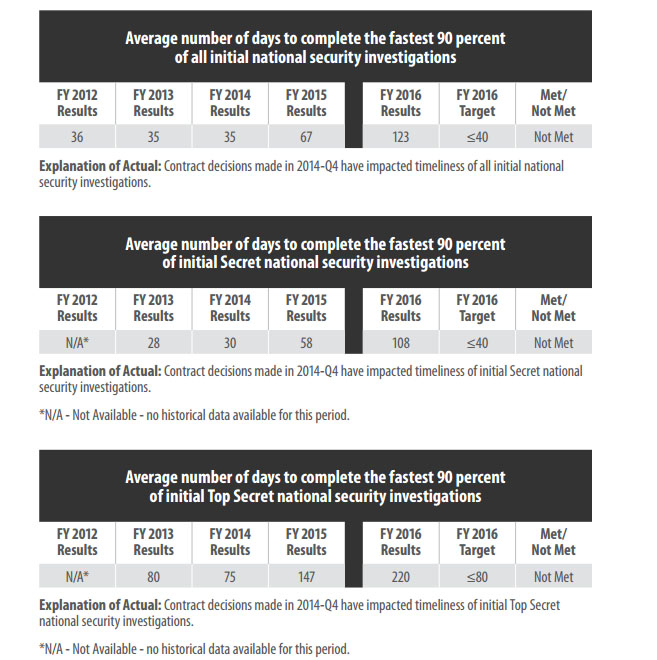

The Office of Personnel Management is behind on its background security checks and retirement claims processing for fiscal 2016. In the agency's financial report,...
If it seems like the wait for your security clearance is endless, that’s because it is — or at least twice as long as it should take, according to goals set by the Office of Personnel Management (OPM).
Despite fiscal 2016 targets of less than 40 days for initial and secret national security investigations, and 80 days for top secret national security investigations, new numbers from OPM’s fiscal 2016 Agency Financial Report show investigations were taking double and triple those times thanks to contract changes and reduced funding.
OPM acting Director Beth Cobert in a message included in the report acknowledged that the transition from the Federal Investigative Services (FIS) to the newly created National Background Investigations Bureau (NBIB) “will take some time,” but the agency is “hard at work building capacity.”
“During fiscal year 2016, OPM made 400 conditional offers of employment to federal field investigators,” Cobert said. “The goal for fiscal year 2017 will be to increase staff levels an additional 200 federal employees.”
It was unclear from the report how many of those offers were accepted

The most recent available data from Performance.gov show the current backlog of investigations stood at 343,557 unprocessed clearances at the secret level and 72,566 at the top secret level by the end of the third quarter of fiscal 2016. The backlog of periodic re-investigations stood at 156,172.
The backlog has long been a thorn in the administration’s side ever since it ended its contract with USIS in 2014. The fiscal 2016 report also notes “contract decisions in 2014-Q4 have impacted timeliness” of the background investigations.
But NBIB Director Charlie Phalen said during a PSC Vision Forecast Conference that while the backlog numbers are interesting, the relevant numbers are “40 or 80, and that’s the number of days we’re supposed to deliver either a secret or a top secret clearance to somebody to adjudicate.”
“That’s our mandated goal by legislation,” Phalen said. “We clearly are not meeting that.”
That unmet goal is one of the fiscal 2016 top management challenges according to OPM’s Deputy Inspector General.
In his Oct. 12 letter to Cobert, which was included in the financial report, Norbert Vint said background investigations, “specifically related to the National Background Investigations Bureau transition and case processing challenges, [have] been added because of the need to meet timeliness expectations and increase resources to improve processes and productivity.”
The IG letter went on to describe the move from FIS to NBIB as “the most significant institutional reorganization since OPM absorbed DOD’s background investigations unit, Defense Security Service, in 2005.”
While working with the Defense Department is a unique partnership, the IG’s office states, it does increase the complexity of background investigations.
Vint’s office pointed to two events that contributed to the backlog of cases:
To address the investigation’s delay and corresponding backlog, OPM awarded four new fieldwork contracts, and plans to raise the cost of conducting the background checks.
“The challenge associated with reduced capacity has been exacerbated by the inaccurate workload projections provided by FIS ‘s customers,” the management report states. “In fiscal 2016, agency workload projections were underestimated by 22 percent, further complicating FIS’s ability to accurately predict and address background investigative workloads. For fiscal year 2017, process efficiencies to reduce total man-hours to complete ongoing work will also be put in place.”
The background investigations backlog isn’t the only backlog addressed in OPM’s top management challenges.
Retirement claims processing is another area that needs attention, according to the agency’s Office of Inspector General.
According to agency numbers, OPM processed 77 percent of 94,545 cases in fiscal 2016 within 60 days.
“As of August 2016, Retirement Services has not met its strategic plan goal of adjudicating 90 percent of retirement cases within 60 days,” the report states. “Specifically, 78 percent of claims 60 days old or less were processed in an average of 42 days, while claims over 60 days old were processed in an average of 112 days.
While the department is working on core components of its Retirement Services Strategic Plan, without proper resources, OPM won’t be able to hit its 90 percent goal.
OPM is working on the retirement claims backlog through a variety of ways, including a move toward electronic processing of all retirement applications, the agency said in its financial report.
“The aged case inventory dropped, but due to a low number of cases in the inventory, the percentage processed with 60 days decreased when older cases were completed,” OPM states “On average, cases processed in 60 days or less took 45 days to complete and cases taking longer than 60 days took 100 days to complete. While the monthly percentage rate of claims processed within 90 days fluctuates, the overall fiscal year to date percentage has remained relatively stable at approximately 80 percent since December.”

OPM’s management challenges are broken into two categories: internal and environmental challenges.
The internal challenges include retirement claims processing as well as:
Along with background investigations, the other environmental challenges are strategic human capital management and federal health insurance initiatives.
Copyright © 2025 Federal News Network. All rights reserved. This website is not intended for users located within the European Economic Area.

